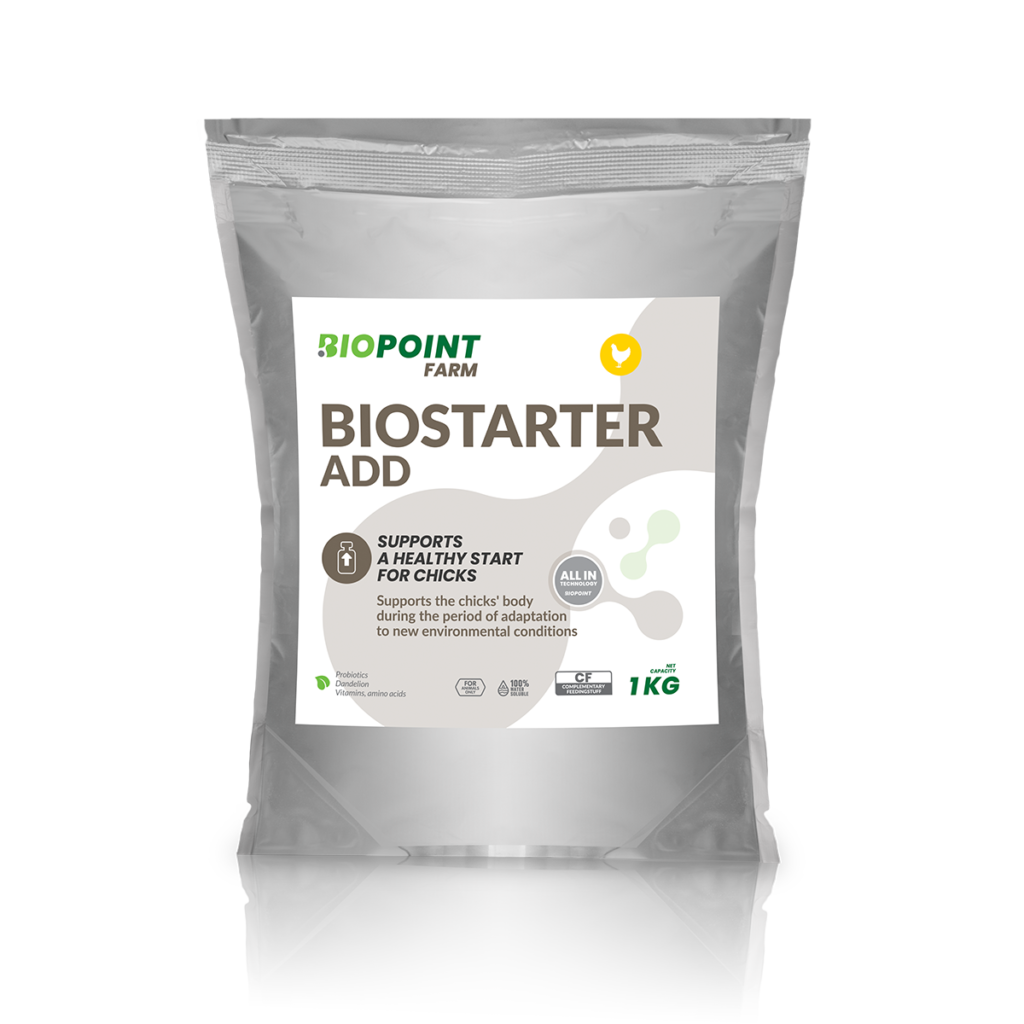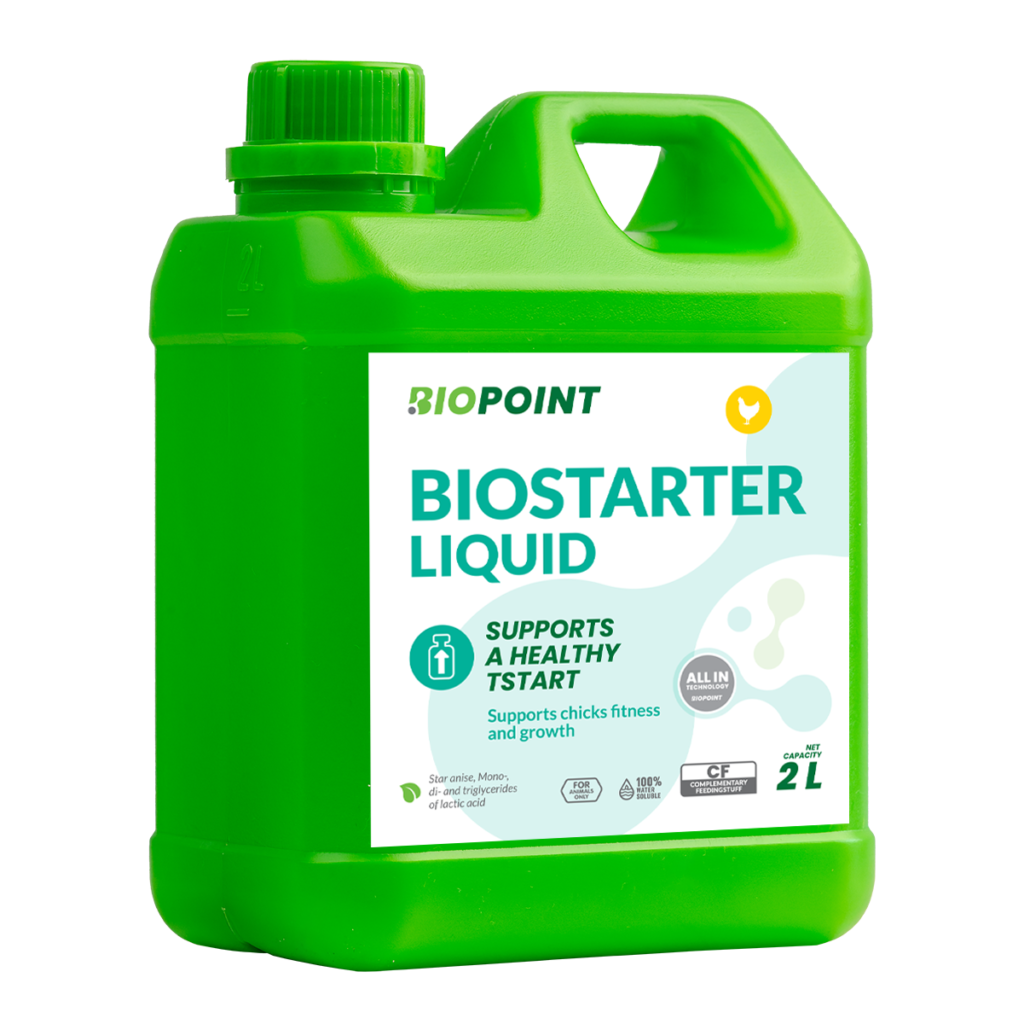
Healthy start – Poultry
BIOSTARTER ADD
BIOSTARTER LIQUID
Ask about the product
BioPoint - support for Poultry in proper development (healthy start)
From the moment chicks hatch, their early days are crucial for setting the stage for optimal growth and development. In this comprehensive guide, we delve into the essentials of chick development, highlighting the importance of non-medicated starters, nutritional strategies, and effective stress management. Our aim is to equip you with the knowledge to promote robust health and productivity in your poultry, ensuring they thrive from the outset.
Understanding Chick Development Needs
Chick development is a critical phase that demands specific environmental and nutritional conditions to foster proper growth and health. During the early stages of life, chicks require a balanced environment that mimics the natural brooding conditions provided by a hen. This includes controlled temperature, adequate humidity, and constant care. Understanding these needs is the first step in ensuring the development of strong, healthy poultry capable of reaching their full genetic potential.
The Importance of Early Nutritional Support
Nutrition plays a pivotal role in the health and development of chicks. From the first day, providing a diet rich in essential nutrients helps to kick-start their growth processes and immune systems. Early nutritional support involves the administration of a well-balanced feed that contains a mix of proteins, vitamins, and minerals, specifically designed to cater to the demanding energy needs of rapidly growing chicks. Ensuring that these young birds receive the right nutrients in the right amounts at the right times is key to avoiding future health issues and promoting vigorous growth.
Key Factors Influencing Early Growth Phases
Several factors influence the early growth phases of chicks, including genetics, feed quality, and management practices. Genetics determine the potential of the chicks, but it is through optimal management and high-quality feed that this potential can be fully realized. Attention to detail in feed formulation to avoid nutritional deficiencies or imbalances is crucial. Additionally, consistent monitoring and adaptation of the living conditions to keep stress to a minimum also play a significant role in achieving desired growth outcomes.
Optimizing Chick Health with Non-Medicated Starters
In the quest for sustainable poultry farming, non-medicated chick starters are gaining prominence. These starters are formulated to support natural growth without the use of antibiotics, aligning with the increasing consumer demand for antibiotic-free poultry products. By focusing on natural growth promoters and robust nutritional formulations, these starters help in developing a strong immune system and enhancing the overall health of chicks.
Benefits of Non-Medicated Chick Starters
Non-medicated chick starters provide numerous benefits, primarily centering on health and safety. These products reduce the reliance on antibiotics, thereby minimizing the risk of antibiotic resistance developing within flocks. They also promote a healthier gut environment by fostering beneficial bacteria, which play a crucial role in nutrient absorption and disease resistance. As a result, chicks grow up healthier with better survival rates and enhanced performance.
How to Choose the Right Starter for Your Poultry
Choosing the right chick starter is crucial for the success of your poultry operation. Consider starters that are specifically formulated to meet the nutritional needs of your particular poultry breed. Look for products that include probiotics, prebiotics, and essential nutrients that support early development. Additionally, assess the reputation and reviews of different brands to ensure you are selecting a product that is trusted and proven in the industry.
Supporting Digestive Health from the Start
A chick’s digestive system is immature at birth, making its early development a critical aspect of overall health and productivity. Supporting digestive health from the start is essential to prevent diseases and ensure efficient nutrient absorption. This involves providing feeds that are easily digestible and formulated with ingredients that promote gastrointestinal health. Ingredients like prebiotics and easily digestible proteins can help nurture the digestive tract, allowing for optimal function as the chick grows.
Enhancing Digestive Structures in Early Development
The structural development of the digestive system in chicks is rapid and needs specific nutrients to support this growth. Special attention to dietary components such as butyric acid glycerides can aid in the differentiation of intestinal cells and the development of intestinal villi. This not only enhances the surface area for nutrient absorption but also strengthens the gut barrier against pathogens, significantly boosting the chick's health and growth capabilities.
Role of Probiotics in Maintaining Gut Health
Probiotics play a pivotal role in establishing and maintaining a healthy gut flora, which is crucial for the immune system and overall health of chicks. By introducing beneficial bacteria early on, probiotics help in outcompeting harmful pathogens, reducing the incidence of gastrointestinal infections. Furthermore, these beneficial bacteria produce enzymes and organic acids that enhance digestion and absorption of nutrients, essential for the robust growth of chicks.
Nutritional Components Critical for Young Chicks
Proper nutrition is fundamental for young chicks to thrive. The diet must include a balanced mix of carbohydrates, proteins, fats, vitamins, and minerals. Each of these components plays a specific role: proteins are essential for muscle development, fats provide energy, vitamins and minerals support metabolic processes and skeletal development. Ensuring that these nutrients are available in the right balance supports healthy growth and development.
Importance of Vitamins and Minerals During Early Growth
Vitamins and minerals are particularly critical in the early stages of a chick's life. They support a range of bodily functions from bone formation to immune system health. For instance, vitamin D3 is essential for calcium absorption and bone growth, while zinc plays a crucial role in skin health and wound healing. A deficiency in these nutrients can lead to developmental delays and increased susceptibility to disease.
Energy Sources: Balancing Electrolytes and Nutrients
Energy management in chicks is vital for maintaining growth rates and overall health. Balancing electrolytes and nutrients in the diet helps regulate the body's fluid balance and provides energy needed for growth processes. Ingredients like sorbitol can serve as quick energy sources, while electrolytes are crucial for maintaining the optimal operation of cellular functions and preventing dehydration.
Stress Reduction Strategies for New Chicks
Stress management is crucial for the well-being and development of new chicks. Stress can stem from various sources such as environmental changes, handling, and transportation. Implementing effective strategies to reduce stress can significantly impact the health and growth rates of chicks. This includes creating a stable environment with controlled temperature and noise levels, gentle handling practices, and gradual acclimatization to new surroundings. Reducing stress in these early stages can lead to a stronger, more resilient flock.
Managing Environmental Stress After Hatching
The post-hatching environment plays a pivotal role in the initial development and stress levels of chicks. Ensuring that environmental conditions such as temperature, humidity, and lighting are closely regulated can help mimic the natural conditions that chicks would experience under a mother hen. Such management helps in reducing stress-induced behaviors and promotes better growth and health by providing a comfortable and conducive growth environment.
Techniques to Minimize Transport Stress Effects
Transportation can be a particularly stressful event for young chicks, potentially impacting their health and growth. To minimize the effects of transport stress, it is essential to ensure that chicks are transported in comfortable, well-ventilated, and adequately spaced conditions. Shortening the duration of transport, providing water and electrolyte solutions before and after transport, and avoiding extreme temperatures are all effective methods to reduce stress during these critical times.
Long-Term Benefits of Proper Early Care
Providing proper care during the early stages of a chick's life has long-term benefits that extend well beyond the initial growth phase. Chicks that are well-nourished and minimally stressed tend to have better immune systems, higher growth rates, and improved productivity. This early investment in proper care can lead to increased efficiency in poultry operations, with healthier birds that are less prone to disease and have better overall performance.
Impact on Lifelong Health and Productivity
The care provided in the first weeks of a chick's life can have a profound impact on its lifelong health and productivity. Early nutritional support, proper environmental conditions, and effective stress management set the foundation for robust growth, high yields, and strong immune systems. These factors contribute significantly to the sustainability and profitability of poultry farming by reducing the need for medical interventions and enhancing the overall quality of life for the birds.
Establishing Foundations for Disease Resistance
Establishing a strong foundation for disease resistance in chicks is essential for maintaining a healthy flock. Integrating strategies like the use of non-medicated starters, promoting a balanced diet, and ensuring a stress-free environment helps in building natural immunity. These practices not only prevent common diseases but also reduce the reliance on antibiotics, promoting a more natural growth process and aligning with consumer expectations for healthier and more ethically produced poultry products.

